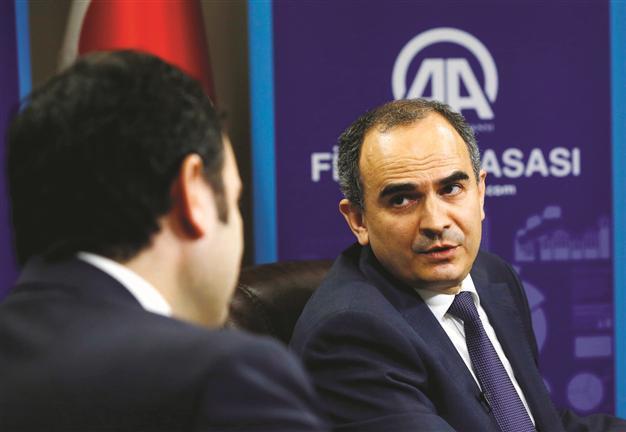Turkish Central Bank ‘gambles’ with no rate hike policy as lira slides
ISTANBUL

Many economists have found Turkish Central Bank Gov. Erdem Başçı’s remarks risky. AA photo
The Turkish Central Bank has taken a big risk by binding itself to a “no interest rate hiking” policy until the end of the year, according to economic analysts, who are concerned that current fluctuations may be permanent rather than just temporary, as the bank seems to think.Central Bank Gov. Erdem Başçı has said he does not intend to raise interest rates to save the Turkish Lira from sliding. The lira has hit record lows on concerns about the outlook for further U.S. stimulus and the conflict in neighboring Syria.
The currency, the value of which began plunging at the end of last week with the release of U.S. Federal Reserve minutes backing a tapering plan, hit record lows yesterday, also spurred by worries about the consequences of a possible international intervention in Syria.
The lira fell below 2.07 to the dollar in initial trading, and then rallied slightly to 2.0527. At the close of Aug. 27 it had been 2.0382.
The lira has been one of the worst-hit currencies in emerging markets in the past few months due to worries that the Fed will soon start reducing its massive bond-buying program, which had flooded developing economies with cheap liquidity.
The Central Bank had raised its overnight lending rate by 50 basis points to 7.75 percent, but in a much-discussed interview with Anadolu Agency on Aug. 27, Başçı strongly asserted there would not be any further hikes by year-end.
The bank has been tightening monetary conditions through an unorthodox mix of repo auctions and changes in its interest-rate corridor, its guide on managing liquidity, but has left its main benchmark rate – the one-week repo rate – unchanged at 4.5 percent.
“Turkey’s Central Bank is digging itself into a deeper hole. For a country whose forex reserves barely cover its short-term external debts, this is highly imprudent policymaking,” Nicholas Spiro of Spiro Sovereign Strategy told Reuters.
Başçı’s statement had created an impact on investors that was far from intentional, as the lira continued plunging throughout the interview.
His attitude and remarks, which were clearly aimed at displaying a confident and cool stance regarding to recent fluctuations in the Turkish currency, was apparently perceived in a completely opposite way by most viewers.
“Central Bank Gov. Erdem Başçı was so excited, nervous and anxious while answering questions, his ‘We’re comfortable, we’re very comfortable,’ words seemed like he was whistling past a graveyard,” daily Radikal columnist Uğur Gürses said yesterday.
In addition to his body language, Başçı’s word choice was also unexpected for a Central Bank official, as he used phrases like “we will protect the lira like lions,” and “believe in me and win,” in order to assert his pledge to protect the lira.
Many analysts warned of the risks of adopting a bold approach for central banks, as their duty may require some steps back according to changing circumstances. Başçı’s vow to keep interest rates low has been panned in this respect as well.
Many analysts and investors praise Başçı’s attempt to clear out any interest rate rise expectation from the market, but says it would be only meaningful if the dollar’s rally against lira and capital outflows was temporary, which many of them suspect.
“There are two possibilities: these developments of the past three months might be temporary, which means they could be finished by the end of the year, or they might be permanent and Turkey will face these kinds of problems for one or two years more. Başçı’s remarks yesterday signaled that the bank thinks it is temporary and is taking measure according to that,” prominent economist Fatih Özatay told the Hürriyet Daily News in a phone interview.
“I think we will experience these kinds of fluctuations from time to time for two, three, or more years. The bank is taking a big risk,” Özatay added.
He also warned that even if the Fed tapering concerns soothed, new concerns regarding the interest rate raise timing of the U.S. Central Bank would inevitably then emerge.
















